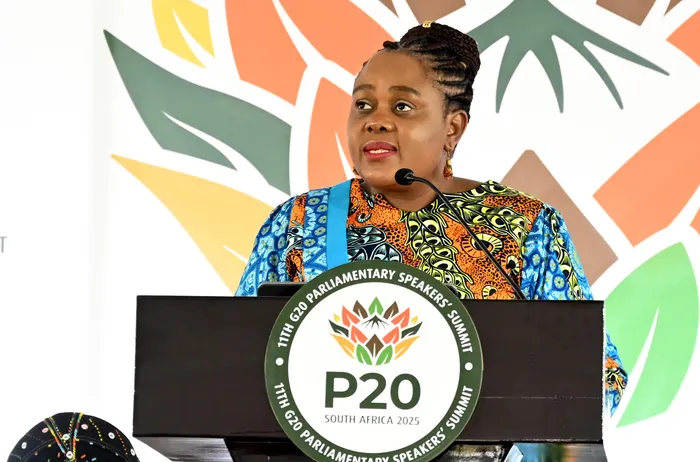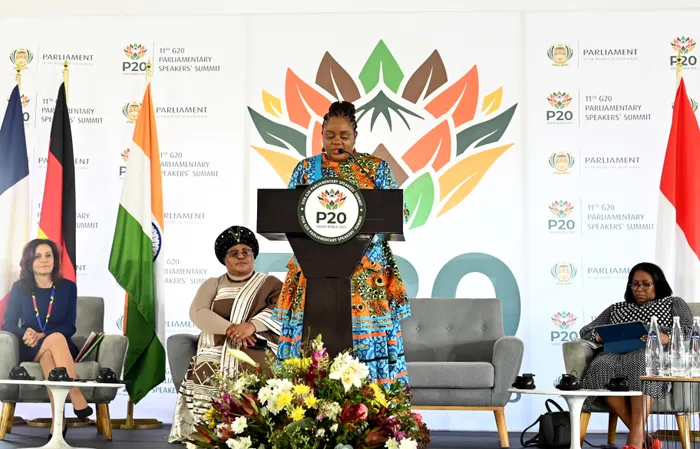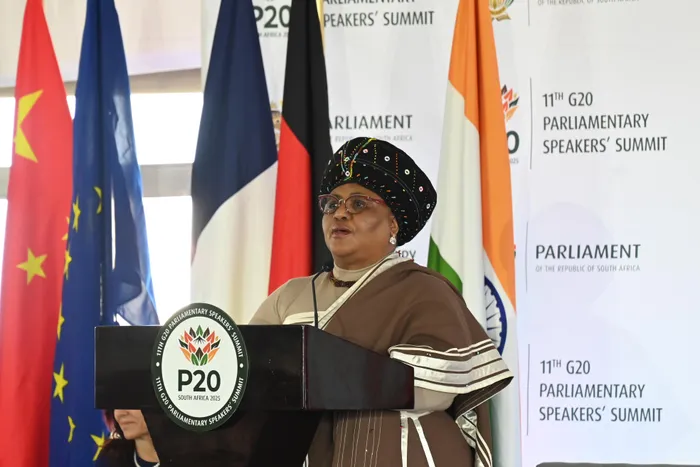P20 Summit: Global solidarity is far removed from the everyday realities of many, says Kubayi

The Minister of Justice and Constitutional Development, Mmamoloko Kubayi, said the 11th G20 Parliamentary Speakers’ (P20) Summit is a call to action when she stepped in to deliver the keynote address, in the absence of President Cyril Ramaphosa.
Image: Ayanda Ndamane/Independent Newspapers
The Minister of Justice and Constitutional Development, Mmamoloko Kubayi, said the 11th G20 Parliamentary Speakers’ (P20) Summit is a call to action.
Kubayi, stepped in to deliver the keynote address, in the absence of President Cyril Ramaphosa, saying the P20 is a unique platform for strengthening global collaboration.
“It is an opportunity for the parliaments of the G20 countries to exchange ideas, to network, and to contribute substantively to resolving the most pressing issues of our time.”
She highlighted how the parliamentarians are gathering at a time when the world is beset by problems on several fronts, including conflicts and war, climate change, digital disruption, geopolitical instability, pandemics and other global health crises.
“These crises intersect, and though they may vary with respect to intensity and lived experience, they affect us all.
“As the institutional anchor of democracy, parliaments play a number of mutually reinforcing roles,” she said.
She added that beyond being chambers of debate, parliaments are the crucial bridge between citizens and the state.
“They are the place where the destinies of nations are charted. Human dignity is at the centre of our aspirations as governments, as parliaments and as societies.”

The Minister of Justice and Constitutional Development, Mmamoloko Kubayi at the 11th G20 Parliamentary Speakers’ (P20) Summit.
Image: Ayanda Ndamane/Independent Newspapers
Kubayi added that they were encouraged by the equally high level of ambition articulated at the second P20 Meeting of Women Parliamentarians that concluded on Tuesday.
“We are particularly encouraged that the issue of women’s representation in the global climate response was a major issue of discussion.
“It is clear that we need to pursue sustainable development in our respective countries first and foremost. We need to improve representation and inclusive participation in that development,” Kubayi said.
“For many, global solidarity is far removed from their everyday realities of access to employment, health care, education and (access) to a decent quality of life. We are contending with rising inequalities between and within societies, and between the Global North and Global South.
“In many parts of the world, rising populism, xenophobia and extreme forms of nationalism threaten to undermine solidarity.
“It is therefore incumbent upon us as parliaments to bring our institutions closer to the people, to restore the bonds of trust and to make all citizens part of the effort to achieve the Sustainable Development Goals,” Kubayi said.
She said the P20 is a valuable forum for the exchange of best practices between the different G20 parliaments on how to consolidate faith in democracy and adapt to contemporary realities.
“For the international commitments of the G20 to be effectively translated into national realities, and for the 2030 Agenda for Sustainable Development to have practical meaning, implementation must be felt on the ground.
“As the bridge between citizen and state, the challenge for parliaments the world over is to translate hope into purpose and promise into action.”

National Assembly Speaker, Thoko Didiza, delivered an opening address at the 11th G20 Parliamentary Speakers’ (P20) Summit
Image: Ayanda Ndamane/Independent Newspapers
During her opening remarks, National Assembly Speaker Thoko Didiza set the scene, touching on similar points that Kubayi had expanded upon.
“Legislatures are not only the guardians of democracy, but also the architects of inclusive development. The theme of this year’s summit is ‘Harnessing Parliamentary Diplomacy for the Realisation of Global Solidarity, Equality and Sustainability’. It speaks to the urgent need for collaborative leadership in addressing the challenges facing humanity.
“We meet at a time when the global landscape is being reshaped by intersecting crises and opportunities. The world continues to grapple with aftershocks of the Covid-19 pandemic, the rising geopolitical tensions that we have experienced in our different regions, armed conflicts, and the accelerating pace of climate change and technological advancement,” Didiza said.
“The G20, under South Africa’s presidency, has responded with transformative initiatives aimed at shaping a more equitable and sustainable future.”
theolin.tembo@inl.co.za
Related Topics: